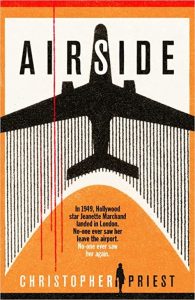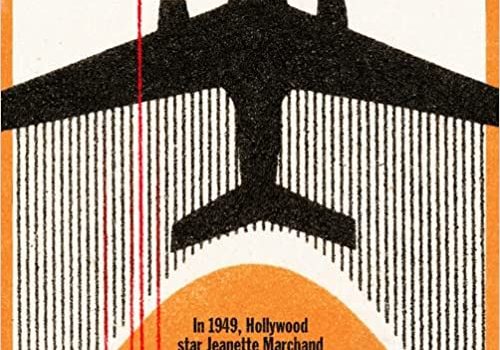Gary K. Wolfe Reviews Airside by Christopher Priest
 Airside, Christopher Priest (Gollancz 978-1-3996-0883-1, £22.00, 298pp, hc) May 2023.
Airside, Christopher Priest (Gollancz 978-1-3996-0883-1, £22.00, 298pp, hc) May 2023.
I confess I’ve probably been overusing the word ‘‘liminal’’ for a while now, but so has everyone else. If there were a National Critics’ Examination, ‘‘liminal’’ would almost certainly be one of the answers. But Christopher Priest’s Airside is a novel which openly embraces and explores the nature of liminality and liminal spaces such as airports, hotels, conventions, and film festivals – settings where you’re not quite in one place and not yet in another, but in a kind of twilight zone limbo with its own rules and regulations. It’s a setting that lends itself easily to horror, as in Stephen King’s ‘‘The Langoliers’’, or to whimsical fantasy, as in some of Le Guin’s Changing Planes stories, or to comedy, as in films like Jacques Tati’s Playtime or Steven Spielberg’s The Terminal. Priest is aware of all these possibilities, as evidenced by the fact that the Tati and Spielberg films not only are mentioned in Airside, but are given full-chapter reviews, ostensibly by Priest’s protagonist Justin Farmer, a film critic and historian. Airside isn’t only about liminality; it’s a pretty liminal novel itself, part mystery, part coming-of-age tale, part Hollywood satire (there’s a wonderful Spielberg-like mogul who shows up late in the novel), and, just maybe, part fantastika. It’s the sort of novel that turns out to be just about as fantastic as the individual reader interprets it to be.
With its low-flying aircraft, film celebrities, crashes, and artificial landscapes, Airside may also be the most Ballardian of Priest’s novels. The initial mystery involves a fading film star named Jeannette Marchand, who in 1949 landed in London’s still-new Heathrow Airport and promptly disappeared without a trace, having been seen departing the aircraft but never showing up at passport control, customs, or anywhere else. The focus soon shifts to Farmer, who has been fascinated by Marchand’s films since childhood and who, as a young film scholar, sets out to unravel the puzzle of her disappearance. But first we learn about Farmer’s childhood in Manchester, his growing fascination with airplanes and in particular with a 1957 plane crash, and his growing reputation as a film scholar, fueled in part by his lifelong obsessive note-taking of virtually every film he sees. His research eventually leads him to meet a few figures who once knew Marchand – a German refugee, an aging minor Hollywood actress, a former chef to celebrities – while his own experiences in airports become more disorienting and frightful, especially in Baltimore and Seoul. Not only are airports liminal spaces, he observes – constantly changing, always under construction, rigorously divided into landside and airside by security checkpoints – but they can be sources of the sort of psychic terror that so often preoccupied Ballard’s characters.
While Airside is centrally Farmer’s story, the mystery of Jeannette Marchand is never far from the surface, and Priest skilfully reveals how events from Farmer’s career offer clues to the disappearance, leading toward a harrowing, near-apocalyptic setpiece at a film festival in Australia. Equally ingenious is the manner in which Priest interpolates documents, such as interviews and reviews of actual films, which reinforce and deepen his central themes while revealing more aspects of Farmer’s consistently restless character; all the films reviewed, for example, even Casablanca, take place in distinctly liminal settings. ‘‘The airport is the only way in to or out of Casablanca,’’ we are reminded in an essay written by Farmer for the film’s 40th anniversary. ‘‘Disappearance is desired, and frequently achieved,’’ as though the classic film itself anticipates Marchand’s vanishing decades later. The novel ends, as it began, with a mystery, but mostly it’s a haunting exploration of fame, alienation, anxiety, the act of observation, and the terror of feeling trapped in spaces where no one really belongs.
Gary K. Wolfe is Emeritus Professor of Humanities at Roosevelt University and a reviewer for Locus magazine since 1991. His reviews have been collected in Soundings (BSFA Award 2006; Hugo nominee), Bearings (Hugo nominee 2011), and Sightings (2011), and his Evaporating Genres: Essays on Fantastic Literature (Wesleyan) received the Locus Award in 2012. Earlier books include The Known and the Unknown: The Iconography of Science Fiction (Eaton Award, 1981), Harlan Ellison: The Edge of Forever (with Ellen Weil, 2002), and David Lindsay (1982). For the Library of America, he edited American Science Fiction: Nine Classic Novels of the 1950s in 2012, with a similar set for the 1960s forthcoming. He has received the Pilgrim Award from the Science Fiction Research Association, the Distinguished Scholarship Award from the International Association for the Fantastic in the Arts, and a Special World Fantasy Award for criticism. His 24-lecture series How Great Science Fiction Works appeared from The Great Courses in 2016. He has received six Hugo nominations, two for his reviews collections and four for The Coode Street Podcast, which he has co-hosted with Jonathan Strahan for more than 300 episodes. He lives in Chicago.
This review and more like it in the August 2023 issue of Locus.
 While you are here, please take a moment to support Locus with a one-time or recurring donation. We rely on reader donations to keep the magazine and site going, and would like to keep the site paywall free, but WE NEED YOUR FINANCIAL SUPPORT to continue quality coverage of the science fiction and fantasy field.
While you are here, please take a moment to support Locus with a one-time or recurring donation. We rely on reader donations to keep the magazine and site going, and would like to keep the site paywall free, but WE NEED YOUR FINANCIAL SUPPORT to continue quality coverage of the science fiction and fantasy field.
©Locus Magazine. Copyrighted material may not be republished without permission of LSFF.






